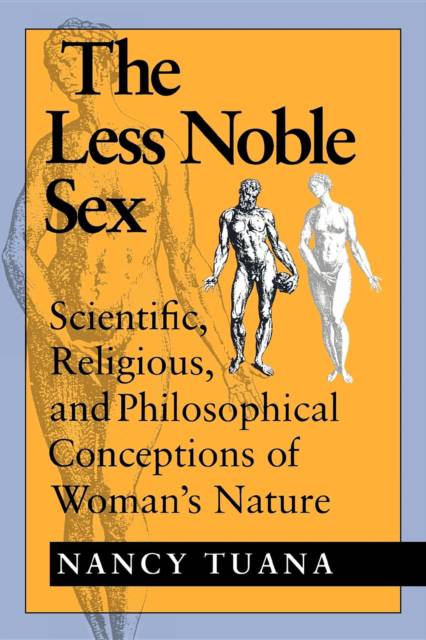
- Retrait gratuit dans votre magasin Club
- 7.000.000 titres dans notre catalogue
- Payer en toute sécurité
- Toujours un magasin près de chez vous
- Retrait gratuit dans votre magasin Club
- 7.000.0000 titres dans notre catalogue
- Payer en toute sécurité
- Toujours un magasin près de chez vous
The Less Noble Sex
Scientific, Religious, and Philosophical Conceptions of Woman S Nature
Nancy Tuana
40,95 €
+ 81 points
Description
"This highly-readable work traces a set of beliefs about the nature of woman that have informed, and in turn have been reinforced by, science, religion, and philosophy from the classical period to the nineteenth century. . . . [T]his book's analysis lends support to claims that the gender system affected our very conceptions of science." -Journal of the History of the Behavioral Sciences "An important book for the educated general public as well as for scholars in many disciplines. Highly recommended." -Library Journal "Students and researchers alike will welcome this carefully argued volume that so clearly traces the dominant contours of Western conceptions about women." -Isis "Nancy Tuana's book is brillant. In under two hundred pages she presents a concise account of how women have been perceived in relation to men in the Western world for the past 2,500 years." -American Historical Review "A wide-ranging discussion of conceptions of women in science, philosophy and religion from ancient times to the late nineteenth century, Tuana's book makes it devastatingly clear how powerful and how deeply rooted was the Western idea of women as men's inferiors." -Women's Review of Books " . . . an unusually readable account of the image of women from the Greeks to the nineteenth century, wedded to a highly interesting argument about the way religion and philosophy affect the direction of the work of scientists, and how the work of scientists is used by philosophers and clergy to give authority to the more abstract world of ideas." -Magill Book Reviews Provides a framework for understanding the persistence of the Western patriarchal view of woman as inferior. Tuana examines beliefs that were accepted a priori as evidence of women's inferiority and studies early theories of woman's nature to illustrate the way scientific literature, was influenced by-and in turn affected-religious and philosophical tenets.
Spécifications
Parties prenantes
- Auteur(s) :
- Editeur:
Contenu
- Nombre de pages :
- 240
- Langue:
- Anglais
- Collection :
Caractéristiques
- EAN:
- 9780253208309
- Date de parution :
- 01-12-93
- Format:
- Livre broché
- Format numérique:
- Trade paperback (VS)
- Dimensions :
- 158 mm x 235 mm
- Poids :
- 349 g

Les avis
Nous publions uniquement les avis qui respectent les conditions requises. Consultez nos conditions pour les avis.






